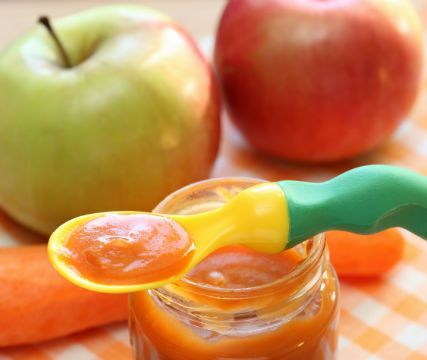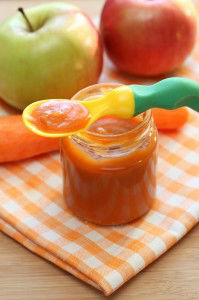
When babies first start eating solid food, we obviously want it to be the most gentle and nutritious food out there. However, when we choose manufactured baby food in jars and packages, we may not be making the wisest choice.
The following are five things that may be in your baby or toddler’s food – which definitely do not belong there.
Pesticides
Unless it is labeled “Organic,” you can bet that your baby’s food has been made from conventionally-grown produce, which is often grown doused in pesticides. Each year, the Environmental Working Group (EWG) compiles a “Dirty Dozen” list of the produce with the highest pesticide concentrations – produce which should always be purchased organic.
This year’s “Dirty Dozen” list includes apples, peaches, strawberries, spinach, kale, snap peas, grapes, peaches, cucumbers, potatoes, bell peppers and hot peppers. Keep in mind that other produce may contain levels of pesticides too – just not as high.
Lead
Lead is a toxic metal linked to debilitating effects on developing minds, including decreased IQ. Disturbingly, unsafe levels of lead have been found in some baby foods.
As we reported last year, California Bay Area’s Environmental Law Foundation (ELF) sampled 146 national brands of baby food, apple and grapes juices, fruit cocktail and packaged peaches and pears, and found that 125 of the samples had levels of lead higher than 0.5 micrograms per serving – the amount allowed by California’s Safe Drinking Water and Toxic Enforcement Act of 1986.
Fluoride
If you look at the label of some baby water brands (used for mixing formula), you may see that they contain added fluoride. This is scary, because a large number of experts agree that fluoride is dangerous and should not be ingested. Research compiled by the Fluoride Action Network (FAN) links fluoride ingestion to lowered IQ, thyroid suppression, bone damage, kidney failure and infertility, among many other debilitating health concerns.
As many counties in the United States still add fluoride to public water supplies, beware. Check if this is the case in your community – if so, you may wish to find another water source, especially for young children.
Sugar
Most fruit and vegetable puree baby foods do not contain sugar these days – although some still might, so if you do choose to buy it, carefully check the label. However, granola bars, cookies, crackers, teething snacks and other foods marketed for babies often contain sugar.
As sugar is strongly linked to obesity, type 2 diabetes, immune system suppression and certain cancers, feeding it to your baby is not the wisest choice.
Contaminants
Even organic baby foods with two ingredients – fruit or vegetable puree and water – have to go through processing to get into those cute little jars. During the manufacturing and packaging process, contamination can occur. You may recall the events of 2009, where organic peanut butter bars in Georgia and Texas were found to be contaminated with bird droppings, mold and rodent hair.
While these were not baby food products, they were organic – and organic baby foods are not immune to contamination.
Make your own baby food
First of all, make sure you’ve talked to your baby’s doctor about which foods he or she is ready to start eating, and which are off limits for now. When you’ve got your list, start with the basics. Bananas and avocado are 2 of the easiest baby foods to make, as all you’ve got to do is mash and strain. If the puree is too thick, add a little filtered water.
 Then, you can get into cooking and pureeing other fruits and vegetables. For carrots and apples, for example, simply boil until tender, mash, and strain – you can even cook them together. As your baby gets a bit older, you will be able to start pureeing some of your family’s regular meals for him or her to enjoy – just make sure all ingredients are cleared with your baby’s doctor before serving.
Then, you can get into cooking and pureeing other fruits and vegetables. For carrots and apples, for example, simply boil until tender, mash, and strain – you can even cook them together. As your baby gets a bit older, you will be able to start pureeing some of your family’s regular meals for him or her to enjoy – just make sure all ingredients are cleared with your baby’s doctor before serving.
One more thing: when making your own baby foods, always choose fresh, organic produce. As fruits and veggies sit in the fridge or in the pantry, they not only become less fresh, but they also build up nitrates, naturally-occurring compounds which may be harmful in large doses. So, the fresher the better.
When in doubt, consult your child’s doctor, or a pediatric nutritionist, and you’ll get the answers you need.
-The Alternative Daily
Sources:
http://www.ewg.org/foodnews
http://baby.about.com/od/homemadebabyfood/f/Nitrates-And-Homemade-Baby-Foods.htm
http://blogs.babycenter.com/life_and_home/061912-is-your-babys-food-dangerous
http://www.thealternativedaily.com/lead-and-green-mold-found-in-juice-boxes
http://fluoridealert.org/articles/50-reasons
http://www.thealternativedaily.com/4-sugar-secrets-food-industry-keeping
http://www.nytimes.com/2009/03/04/dining/04cert.html?ref=dining&_r=1&

